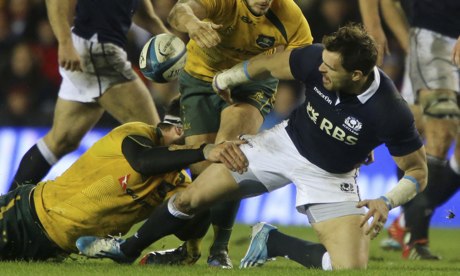
Sean Lamont was musing on another international in which Scotland had matched opponents well above them in the world rankings in attitude but not, crucially, in aptitude. The home side had most of the ball, but the tries were scored by a team that had a makeshift back division and two scrum-halves on the bench.
"We have to keep believing that we can take one of these big sides," said the 82-cap wing, who came within a metre of adding to his 12 international tries at the end of the first-half only to be hauled down by the Australia full-back Israel Folau, who provided most of the evening's few creative moments.
"We were more aggressive than we had been against South Africa [six days before] and we created more chances, so we are progressing. We took it to them, but accuracy let us down, in defence as well as attack. It makes the difference when you play these sides, but we will get there."
The more they ran, the more Scotland stood still. They had nearly 60% of the possession and territory, but rather than be composed as the line beckoned, they decomposed: after Lamont had been held up by Folau – Sean Maitland's pass forcing him to break stride and giving the full-back the time to make the tackle – David Denton knocked on and when early in the second half Greig Laidlaw broke the defence after a lineout, the second-row Grant Gilchrist dropped what should have been a routine take.
The Scotland head coach, Scott Johnson, bristled when it was put to him that his side, which has a return of five penalties in their two matches this month against Sanzar opposition, lacked a cutting edge. The weakness, he said, had more to do with skills, or the lack of them, but too often they tried to move slow ball and had no one with the running lines of Folau who scored Australia's first try and helped create the other.
Australia looked like a team waiting for the year's end. Patched up after losing five players in the buildup to the game, five of whom were suspended by the head coach Ewen McKenzie for their part in a long drinking session in Dublin the week before, they struggled to generate momentum, were again heavily penalised at the scrum and decided it was worth giving away penalties at the breakdown rather than letting their opponents have the ball, perhaps because, even against Scotland, they did not trust a cobbled-together three-quarter line in defence.
They did, though, have Folau, the former rugby league and Australian rules player who has scored nine tries in his first year of Test rugby. "Freak athletes like him do not come along very often," said Johnson, who would dearly like to be given a present of one on a certain day next month. "Coaches can't put in what God left out and he stood in the front of a few genetic queues."
Wales will be wary of Folau on Saturday as they seek to end a dismal run of results against the major southern hemisphere countries. "We are going there as underdogs," said McKenzie. "Warren Gatland [the Wales head coach] has already been talking them up in terms of how they are going to beat us. He sounds quite confident, but that's all right. We will go down there and do our best."
It is not a fixture McKenzie needs any more than his players, but it is worth £750,000 to the financially challenged Australian Rugby Union, although if its players keep breaking guidelines on alcohol consumption and curfews, the fines imposed should end the necessity of having to play an extra international every November.
Scotland: Maitland; Seymour, De Luca, Taylor, (Evans, 66) Lamont; Weir, Laidlaw (Cusiter, 58); Grant (Dickinson, 46), Ford,(MacArthur, 20) M Low (Murray, 50), Gilchrist (J Gray, 66), Hamilton, Beattie, Brown (capt), Denton (K Low, 60).
Pens Laidlaw 5.
Australia: Folau; Tomane, Leali'ifano, Harris, Feauai-Sautia; Cooper, Genia (White, 66); Slipper, Moore (Fainga'a, 77), Kepu, (Alexander, 58) Simmons, Horwill, (Timani, 58) Fardy (McCalman, 75), Hooper, Mowen (capt).
Tries Folau, Feauai-Sautia. Con Leali'ifano. Pens Leali'ifano 3.
Sin-bin Simmons 47.
Referee J Peyper (South Africa). Attendance 56,732.

